 With the rise of Airbnb and other vacation rental websites, it is now easier than ever to create a vacation rental marketing plan.
With the rise of Airbnb and other vacation rental websites, it is now easier than ever to create a vacation rental marketing plan.
As a property management company managing potentially hundreds of vacation rentals, this accessibility can pose both opportunities and challenges when looking to secure short-term guests for the vacation rentals you manage.
While vacation rental properties are typically found in high-tourism destinations, every major city can help to tap into the vacation rental market with a unique set of marketing strategies and tools.
In today’s article, we here at Upkeep Media will be sharing how property management companies can use digital marketing strategies to create long-term success in the vacation rental industry.
This industry may vary significantly from city to city depending on the tourism market and types of visitors coming to the area each year.
The primary goal of any rental property marketing campaign is to generate interest and book your rentals! Any property manager who specializes in vacation rentals knows that it is a difficult market, but we’ll show you how to stand out from your competitors.
We will also discuss digital marketing strategies in-depth, including Search Engine Optimization (SEO), email marketing, and Pay-Per-Click (PPC) advertising.
Let’s get going!
Below, you will learn the key steps in how to make your vacation rentals stand out.
Vacation Rental Marketing Ideas: Creating a Marketing Plan
The first step in creating a marketing plan is to focus on what makes the property unique. Making your clients’ properties stand out from the rest is a surefire way to ensure consistent bookings and overall long-term success.
No matter where you are listing properties – be it Airbnb, a private rental listing site, etc. – these digital marketing strategies and best practices still apply.
In this stage of your marketing plan development, the primary focus is standing out from your competition and maximizing this online.
1. Create an Attention-Grabbing Headline
 Especially in high-tourism areas, a catchy and descriptive title for the vacation rental property can mean all the difference in terms of clicks, inquiries, and bookings.
Especially in high-tourism areas, a catchy and descriptive title for the vacation rental property can mean all the difference in terms of clicks, inquiries, and bookings.
A rental listing should be SEO-friendly to help it rank higher in search results and garner interest from potential guests. Here are some of the best practices for creating a click-generating, catchy title for your vacation rental listings:
- Maximize your word count. Be strategic in the words you choose to help potential guests understand exactly what makes the property unique, just from the title.
Your title should be comprehensive, not wordy or redundant. When creating a successful title, every single word should be strategic and intentional. Don’t forget to include the property’s location, with applicable landmarks, to help narrow the focus for potential guests.
For example, a listing titled “2-bedroom condo in Anaheim” versus “2-bedroom, family-friendly condo only ten-minute drive from Disneyland Main Gate” will garner very different search results, even if the property described is still the same. - Highlight the best features or mention any special deals or location-specific information. Like we mentioned above, creating a compelling title for the vacation rentals you manage is all about creating an experience for the potential guest.
Highlighting exactly what the property offers without creating an overwhelmingly long title is key to attracting clicks and bookings.
For example, instead of just listing “vacation condo for rent,” include information like the number of beds, location, proximity to tourist destinations, other unique features such as access to a pool, etc. - Use symbols for connecting words to help cut down on word count and maximize your title space. For example, using “&” or “+” rather than “and.” However, be careful not to go overboard with these symbols; it is still important to be professional in your vacation rental listing.
2. Write an Engaging and Informative Description
 Writing an engaging, informative, and eye-catching description is the most important time investment you will make when creating a listing. Your description should leave no questions unanswered for the potential guest, and portray professionalism and trustworthiness.
Writing an engaging, informative, and eye-catching description is the most important time investment you will make when creating a listing. Your description should leave no questions unanswered for the potential guest, and portray professionalism and trustworthiness.
A clear and compelling listing will provide potential guests a glimpse into the vacation rental properties you manage and should paint them a picture of what their time in the space will be like.
Some best practices when writing vacation rental property descriptions include:
- Avoid overused words like “nice.” Be as descriptive as possible while not overloading the content. It is best to use words to help the potential guest visualize the space and how they will use it.
- Don’t oversell. Be transparent and honest about the property without overselling the property and its features. Being dishonest and overselling the property will only hurt you in the long run, as you are more likely to receive negative reviews, therefore harming your reputation online.
- More is not always better. Try not to overwhelm your potential guests with an overwhelming amount of information. Short, sweet, and to-the-point copy is the name of the game, here.
- Break up the text by theme or subheading so potential guests can quickly scan your description and find the most important information.
- Avoid overly stern language, as this can come across as abrasive and unwelcoming. Try to use a friendly and professional tone while still sharing the rules for renting the properties you manage.
- Avoid passive voice in your writing. Use direct, active, and concise language, so readers feel as though you are speaking directly to them.
3. Invest in High-Quality Photography and Videography
 When creating a marketing plan for the vacation rentals you manage, investing in high-quality, professional photos (and even videos) can go a long way in securing constant bookings. Your photos should promote each property without deliberately overselling them or appearing dishonest.
When creating a marketing plan for the vacation rentals you manage, investing in high-quality, professional photos (and even videos) can go a long way in securing constant bookings. Your photos should promote each property without deliberately overselling them or appearing dishonest.
Images should be well-lit, shot in panoramic mode so guests can see a complete view of the space, and show the small details that will make it feel special. We highly recommend investing in a professional photographer who is experienced in real estate photography.
Professional photography is essential for you to use as a property manager because these photos can be used on multiple sites and over several months and maybe even years! It also shows that you are a dedicated property manager since you invested in expert shots.
However, if an owner chooses to make substantial or noticeable changes or upgrades to their property, it is important to take new photos so your advertising reflects the actual property.
Pro tip: Include photos of not only the interior of the property but the exterior of the building and the local neighborhood as well. Suppose the property is located close to a highly desirable tourist attraction or area. In that case, it might also be helpful to include photos and/or maps to show the prime location of the property.
4. Video Tours
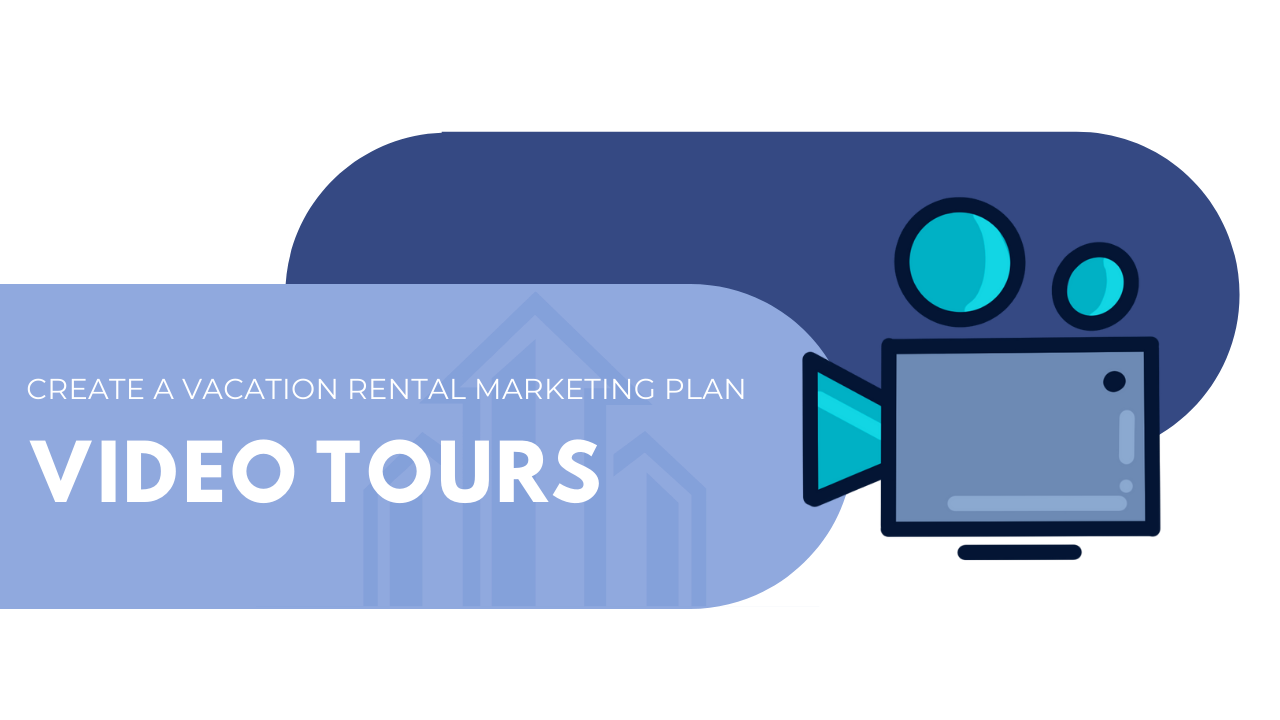 Video tours of vacation rentals can be an excellent way to showcase the space to potential guests, particularly in highly competitive markets.
Video tours of vacation rentals can be an excellent way to showcase the space to potential guests, particularly in highly competitive markets.
A high-quality video tour should highlight all of the key areas of the property, including amenities, outdoor features, and the location. For best results, make sure the space is well lit with natural light, clean, and well-kept.
5. Don’t Forget About Marketing Yourself
 Unlike long-term rentals, vacation property guests often have to interact with the property manager more frequently to address concerns, coordinate check-in and check out, etc.
Unlike long-term rentals, vacation property guests often have to interact with the property manager more frequently to address concerns, coordinate check-in and check out, etc.
As a property management company, creating a reputable, trustworthy appearance for guests is imperative to your overall success. When creating a property manager profile, there are four key areas to consider:
- Profile Photo – using your company logo is a great way to build your company’s reputation in the vacation rental market industry. We recommend having one person designated to manage communications with your property’s guests, so they feel confident with one point of contact.
- Description – share more about your company, your values, and your properties. You never know; a guest may not be interested in this specific property but may be interested in one of your other properties.
- References and reviews – this is critical, especially if using an online rental site like Airbnb. Obtaining and maintaining positive reviews will help boost your property’s search results and online ranking. Any negative reviews should be immediately addressed and remedied if possible.
- Profile Verification – verifying your profile will give guests the peace of mind that you are a reputable company and that your properties can be trusted.
How to Correctly Price the Vacation Rentals You Manage
When creating a marketing strategy for the vacation properties you manage, it’s important to not glaze over some of the most important research you can do: how to price the property in your local market competitively.
Establishing the right price for the rental, and adjusting that price is critical for creating a lucrative vacation rental property in the long term. Understanding your local market means researching what others are doing around you and experiencing trial error as you continue to market your property.
To stand out as an expert in vacation rentals, owners need to know that you will be able to set their properties at just the right price.
We recommend some of these strategies when assessing demand for a property and the right price to charge:
1. Research Similar Properties in the Local Market
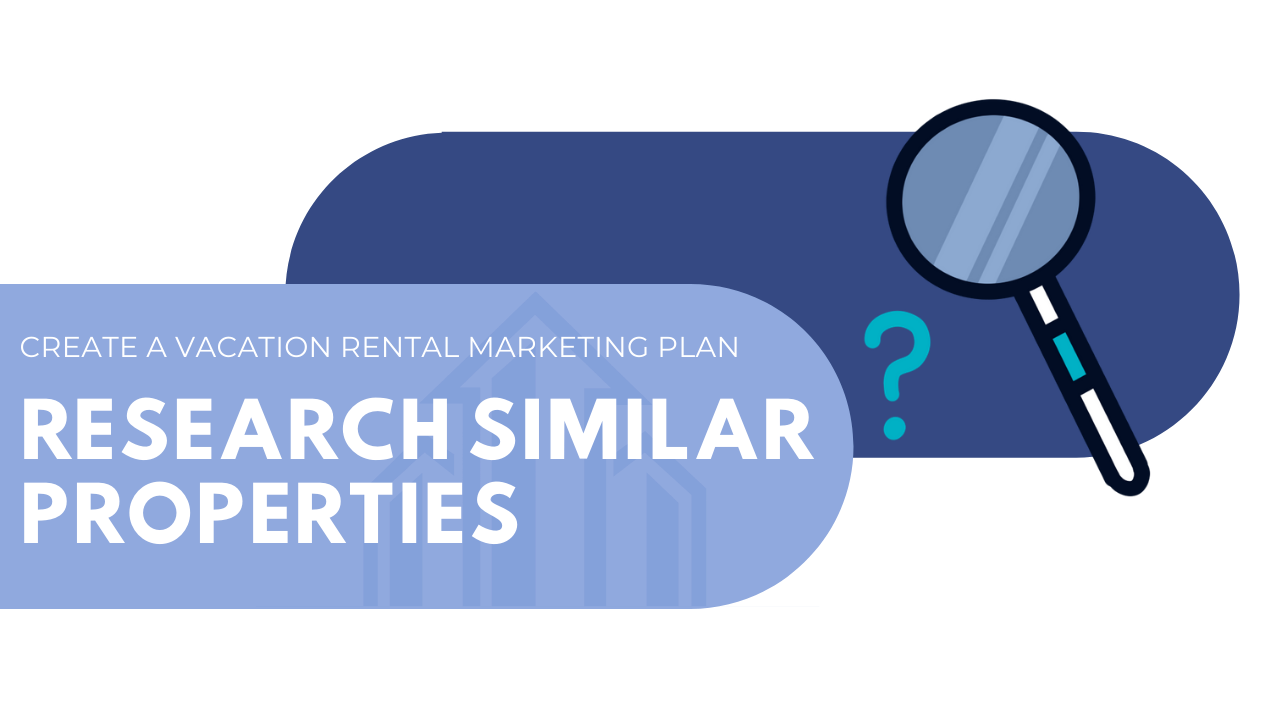 Remember that several different factors contribute to the price guests are willing to pay.
Remember that several different factors contribute to the price guests are willing to pay.
Approximately 60% of the price should be based on the intrinsic value of the property – the number of bedrooms, how up-to-date and user-friendly it is, the location and proximity to popular destinations for travelers, etc.
This 60% is often heavily influenced by what similar properties in the area are charging. Setting the value of the vacation rentals you manage will primarily be based on what value is established in similar rentals.
We recommend using the search functions on popular vacation rental sites to find properties that match the one you are managing. Criteria should include the number of bedrooms/bathrooms and similar amenities, locations, and the condition of the property.
Once you have gathered similar properties, make a chart comparing the prices of each property to help you determine the occupancy rate and average revenue of your closest competitors.
From there, you will have a strong understanding of how best to maximize your client’s ROI. To help keep your data relevant., we recommend only using listings with reviews from actual guests. If no one is staying at the property, their pricing does not serve your research.
The remaining 40% of pricing comes from the strength of your marketing strategy. A property with similar features to the one you are managing could be marketed lower or higher than yours based solely on the strength of their marketing strategies and ability to attract guests.
This 40% is the percentage of your price value that you can largely control through the measures we outline in this article. Similarly, you can influence this 40% by seeking professional help and guidance from property management marketing experts, like the Upkeep Media team.
2. Undercut the Competition, But Only in the Short Term.
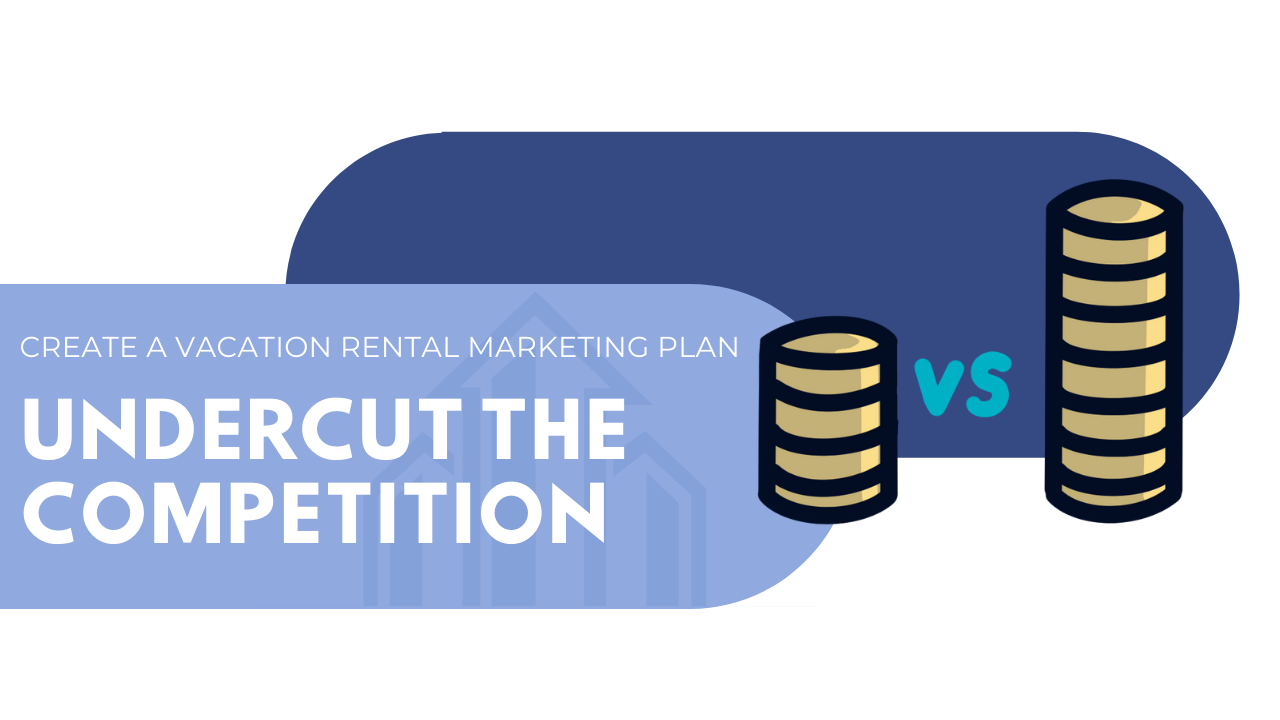 If you are a new vacation rental property manager, it is important to establish a set of reviews to help boost your SEO and the likelihood of getting the properties you manage booked. Vacation rental owners will be looking for a manager with a proven track record.
If you are a new vacation rental property manager, it is important to establish a set of reviews to help boost your SEO and the likelihood of getting the properties you manage booked. Vacation rental owners will be looking for a manager with a proven track record.
Therefore, if you are new to the game, you need to incentivize owners while also attracting guests. You may consider offering owners a discounted management fee.
By offering new owners a discounted management fee, you will be able to price their rentals lower than the estimated market value for the first 1-3 months. This will ensure you can book guests and garner positive reviews quickly.
Once you have established this credibility, you can bring the vacation rental to its estimated market value.
3. Maximize Revenue With Dynamic Pricing
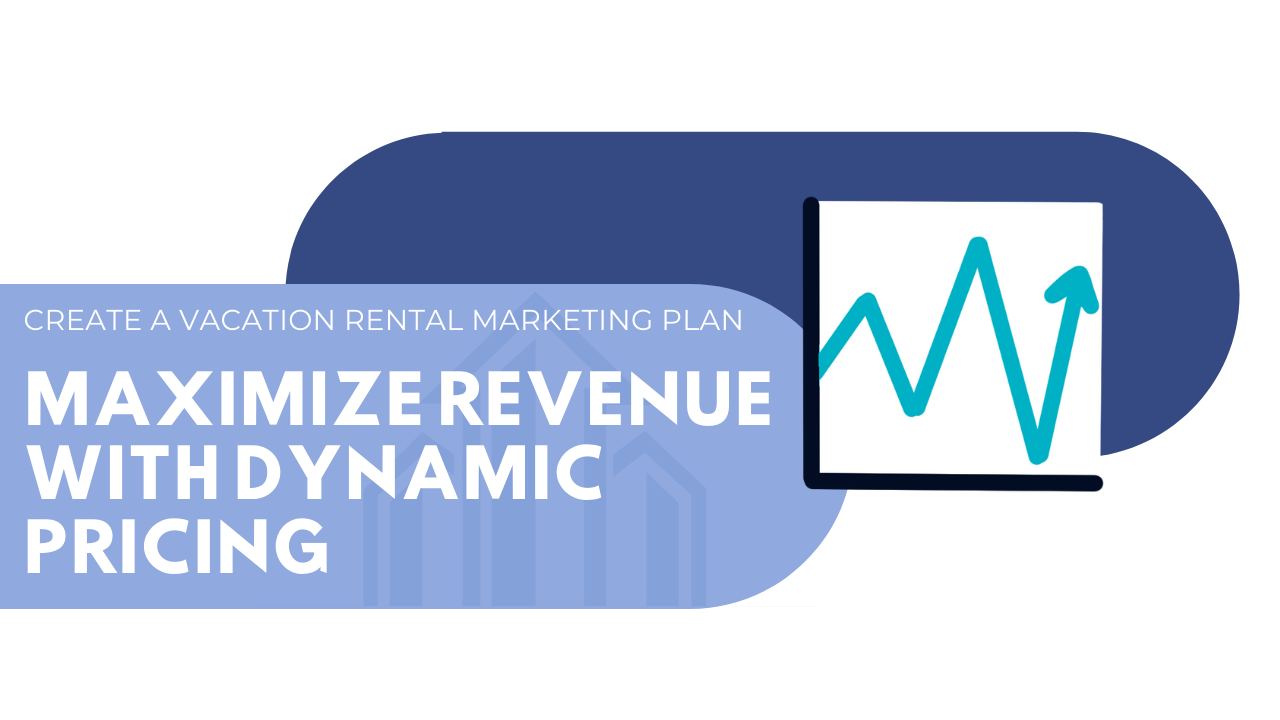 When determining the pricing structure for a vacation rental property, it is important to consider the life cycle of the tourism industry in your area. While many metropolitan areas and major tourist attractions have reasonably consistent, year-round vacation seasons, many places may not.
When determining the pricing structure for a vacation rental property, it is important to consider the life cycle of the tourism industry in your area. While many metropolitan areas and major tourist attractions have reasonably consistent, year-round vacation seasons, many places may not.
If some special events or holidays bring more tourists to your area at specific times throughout the year, your pricing structure should reflect that shift in the market.
These shifts in your pricing structure are called dynamic pricing and can help you maximize occupancy throughout different phases of your local area’s tourism cycle. Potential guests are always on the hunt for the best deal, so make sure you review your pricing thoroughly and often. Vacation rental owners will be more likely to select a property manager who is attuned to these shifts and knows how to utilize them to get the best possible ROI.
Changing your prices to be in line with the high and low seasons will also improve your ranking and therefore you will appear higher on potential search results.
Remember: most people don’t search past the second or third pages of results, so you want to rank as high as possible! This is called search engine optimization, or SEO.
Pro tip: Adjust for weekend and weekday pricing
Having two different prices for weekdays and weekends can help maximize rental opportunities and encourage guests to stay an extra night if the weekday rate is cheaper.
4. Provide More, Charge More
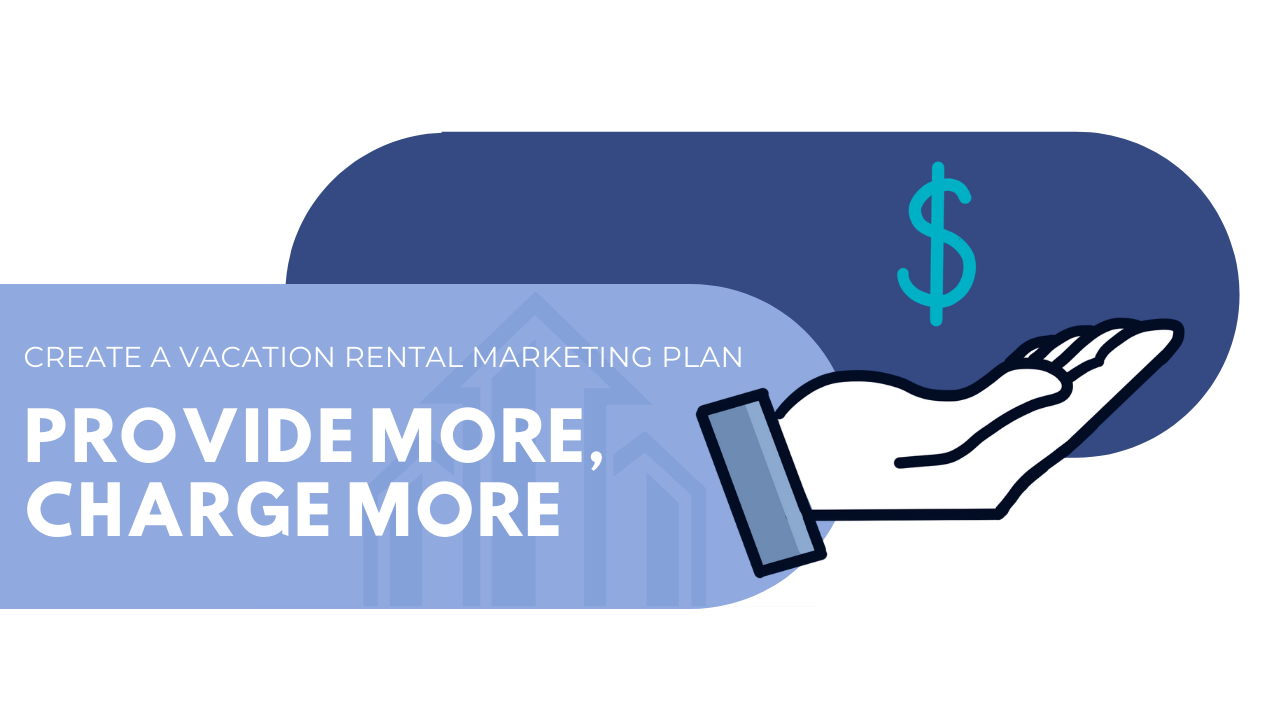 In the vacation rental market, guests often look for experiences and activities to pass the time on their vacation. Many vacation rental owners can help provide those services and make additional profit in the process.
In the vacation rental market, guests often look for experiences and activities to pass the time on their vacation. Many vacation rental owners can help provide those services and make additional profit in the process.
When a vacation rental has additional services and amenities such as a hot tub in the backyard, bicycle rentals, vacation guides, etc., property owners can charge more for their rentals.
As a property manager, you can conduct a Free Rental Analysis for your vacation owner leads. When you conduct your analysis, you can make recommendations on how they might improve their rental.
Improving guest experience will not only help guests to have a great experience in the rental property (making them likely to recommend it to family & friends and review it highly) but will allow you to set the rent at a higher price.
Making these recommendations will provide additional value to the owner, and help to set you apart from your competition.
The Best Ways to Market a Vacation Rental to Potential Guests
As a property manager, you need to be able to show vacation rental owners that you have the expertise to successfully market their property.
This can include advertising, special offers and digital marketing.
In addition to traditional online listing websites, there are several other ways that you should advertise the vacation rentals you manage to potential guests.
While many of these strategies may not seem like the obvious choices for marketing, they can be highly effective in creating a consistent occupancy and guest base for the vacation properties you manage.
Plus, vacation rental owners will see that you go above and beyond when it comes to marketing their properties, making them more likely to choose to work with you over another manager in the area.
1. Social Media
 Social media platforms like Instagram and Facebook are the fastest-growing vehicles that you can use to help the properties you manage stand out from the crowd.
Social media platforms like Instagram and Facebook are the fastest-growing vehicles that you can use to help the properties you manage stand out from the crowd.
Social media can be used on its own, or in conjunction with other marketing strategies such as online website listings, to help give potential guests a peek into the property while ensuring you’re reaching a wide network of potential guests.
Here are just a few ideas of how you can market the vacation rental properties you manage on social media channels such as Instagram and Facebook.
Include lots of images and videos of the property so potential guests can get an in-depth look at what a stay at the vacation rental property might look like.
On many listing sites, such as Airbnb, you are limited to the number of photos and videos you can share. On social media, you can continue to update your photos and videos weekly or even daily.
Social media is also a great place to establish yourself as a real estate expert in the area. By sharing local information, restaurant recommendations, insider tips, and other relevant tourism info on your social media accounts, you can become an excellent resource for potential guests. Not only that, but vacation rental owners will see your local knowledge as well, and that you go above and beyond when it comes to attracting guests to their properties, making you an ideal property manager who goes beyond the rest.
Establishing yourself as a source of knowledge about the area is just another unique way to promote a vacation rental.
Social media platforms such as Facebook and Instagram have extensive online advertising capabilities that can often be leveraged for a nominal cost.
Contrary to the cost of setting up a website and paying for more extensive pay-per-click advertising, social media advertising is usually a lot more accessible.
For even just a few dollars, you can advertise your vacation rental homes to a target audience and maximize booking potential, all from an app on your phone!
2. Forums and Local Bloggers
 Many savvy property managers find new potential guests through online forums and local bloggers that focus specifically on tourism in your area.
Many savvy property managers find new potential guests through online forums and local bloggers that focus specifically on tourism in your area.
Regional forums are a great resource for vacation rental property managers, and allow you to interact with vacation rental owners and convert them to leads. Depending on the local community, forums can also be a great way to advertise and generate word-of-mouth to promote your listings.
In addition to forums, lifestyle bloggers and other influencers can also help leverage their social reach to help encourage bookings at your vacation rental properties. This is especially true for local tourist destinations that have bloggers and influencers who focus on that specific area.
For example, Disneyland and Disney World have many online bloggers and influencers that routinely share tips, tricks, and Insider information about staying near the parks.
If you manage a vacation unit near these parks, then you could establish relationships with these types of influencers to promote that vacation rental listing. This will help you reach potential audiences that you may have never thought of.
In addition, these bloggers and influencers can also be great sources of information. They can provide insight and recommendations on how best to leverage your rental listing to appeal to a larger number of guests.
We recommend keeping a steady eye on the local tourist industry in your area to make sure that you are well aware of trends that might impact the overall success of the vacation rentals you manage.
How to Leverage Your Marketing Plan in the Right Places
 Now that you have established a strong marketing plan as a vacation rental property manager, it’s time to start putting all your planning to good use. But where to begin?
Now that you have established a strong marketing plan as a vacation rental property manager, it’s time to start putting all your planning to good use. But where to begin?
Start by doing thorough research into the types of vacation rental listing websites in your area. While there are a few big-name sites that come to mind, like Airbnb, most local tourist destinations have several niche and locally-focused vacation rental websites that you should be advertising on.
Conducting a simple Google search will reveal a lot of information about the types of advertising your competitors are doing in this market and which of these listing sites are getting the most traffic.
Some of our recommendations for websites that you should be using to list your vacation rental properties include:
Google Vacation Rental Listings
By listing your website on Google Vacation Rental Listings, you ensure that the properties you manage have a fighting chance to appear at the top of a Google search.
These vacation rental listings are often the first listings that guests will browse when looking for a vacation rental property in a specific area.
VRBO and HomeAway
These two websites are part of Expedia’s network of hotel and vacation rental property listing websites. Listings on these sites generally appear quite high in search engine results, and are a good way to reach potential guests.
Airbnb
Airbnb is another one of the most common vacation rental listing sites today. While Airbnb search results may not show as high as Google Vacation Rental Listings, potential guests will often go directly to Airbnb to find listings which is why it’s important to advertise your Airbnb listings.
By ensuring that your SEO strategy encompasses Google and other listing websites, you are helping your rentals reach the maximum number of potential guests, which will keep your owners happy.
Other vacation rental property websites you should be posting on include Flip Key, Trip Advisor, local niche sites specific to your region or area, Expedia, Hotels.com, and even your own website where you can pay for Google advertising.
Top Three Digital Marketing Strategies For Your Vacation Rental Listings
SEO
 Search Engine Optimization (most commonly known as SEO) is a digital marketing strategy that helps optimize your website with relevant content. The goal of SEO strategies is to improve search engine rankings on online search engines, such as Google.
Search Engine Optimization (most commonly known as SEO) is a digital marketing strategy that helps optimize your website with relevant content. The goal of SEO strategies is to improve search engine rankings on online search engines, such as Google.
SEO is part of a complex network of algorithms, search engine crawlers, and metadata.
In short, the code that allows your website to function is indexed and searched by Google to return quick, lightning-fast search engine results when a user searches a specific set of terms.
By using a search engine optimization strategy for your vacation rentals, you can ensure that when a potential guest searches for a series of words (such as “vacation rental in Miami”), your website will appear as high as possible on the search engine results.
This type of SEO is critical in highly competitive markets, as many potential guests may not scan past the first or second page of Google results before finding a vacation home to book.
There are a number of SEO-friendly strategies that you can implement on your own, such as optimizing your content with search engine keywords.
However, the technical elements of SEO can often be far beyond the reach of many individuals outside the digital marketing space.
For property managers, working with the team at Upkeep Media can be invaluable in helping to improve your search engine optimization, search engine ranking, and overall website user experience.
Email Marketing
 As a vacation rental property manager, creating targeted email marketing campaigns can amplify the lines of direct communication with past, potential, and future guests.
As a vacation rental property manager, creating targeted email marketing campaigns can amplify the lines of direct communication with past, potential, and future guests.
By building your email marketing list, you can entice past guests to book again and build a steady stream of guests.
This type of streamlined and automated email marketing process improves guest experience.
Some common ways to use email marketing include:
- Sharing information with guests before they arrive
- Sharing a review request once a guest has checked out. This will help generate more positive reviews.
- Newsletters with local information, new listings, and information about the property to remind guests about their stay.
- Automated emails based on the activity on your website. For example: email messages to guests who have visited your website, but haven’t followed through to complete the booking.
Like telemarketing calls or door-to-door solicitors, email marketing must be used with caution to be effective. Overusing this strategy can lead to non-engagement and annoyance from your potential or past guests.
It is important to find that delicate line so you can share friendly, informative, and relevant content without being considered spam.
Be sure to keep your list updated with all of your relevant guest data, but remember that guests have to opt-in to receive your email campaigns. Email marketing is an effective way to directly reach your target audience and convert past guests into return bookings.
There are a number of strategies, platforms, and techniques to consider when implementing email marketing into your vacation rental management business. This is especially true when integrating email marketing with an existing website to help close sales.
At Upkeep Media, we have extensive experience in integrating email marketing specifically for property management companies and can help turn your vacation rental process into an automated experience.
Pay Per Click (PPC)
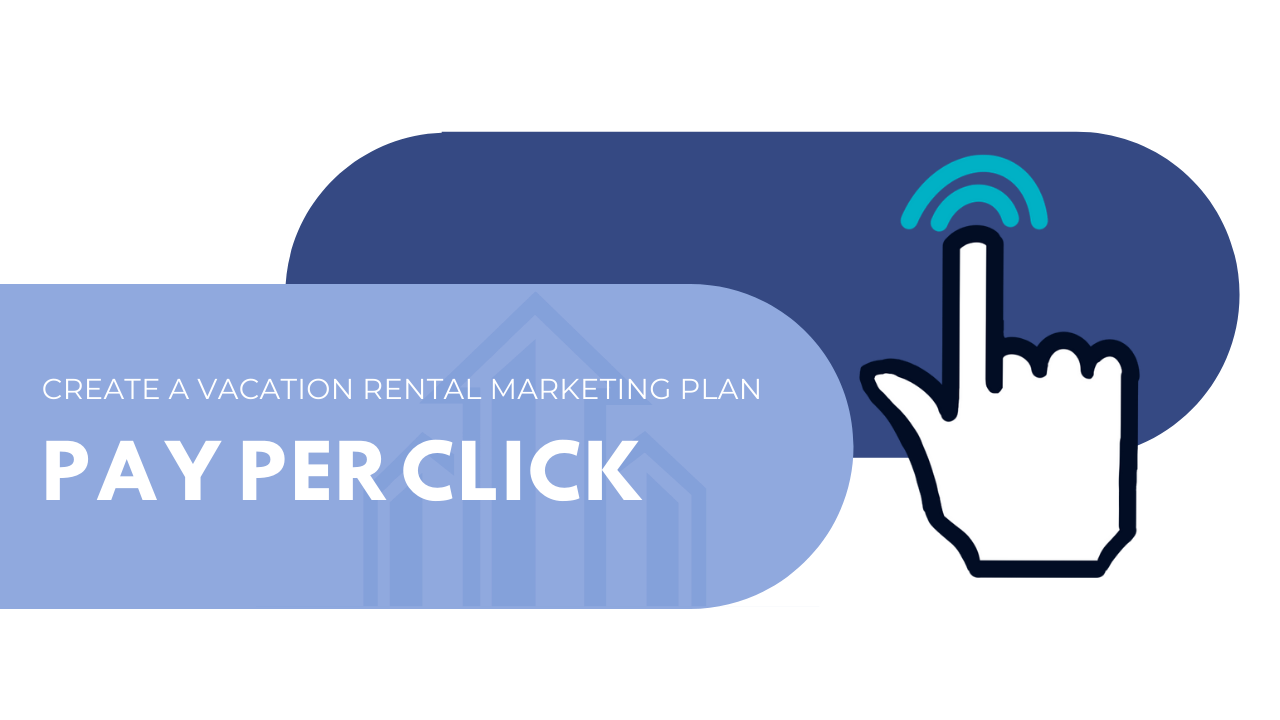 Pay per click (or PPC) is a form of advertising that involves exchanging a certain amount of money every time a person clicks on your web link.
Pay per click (or PPC) is a form of advertising that involves exchanging a certain amount of money every time a person clicks on your web link.
These advertised web links are very easy to spot – they appear above the ‘organic’ results on search engines such as Google.
PPC ads can also appear as text or graphic ads on the sidebars or footers of other websites. Pay-per-click can be a highly effective online advertising strategy primarily because of the low cost and high reward.
In PPC advertising, you only pay when someone clicks your ad, not when someone simply views it. As a result, you may only pay a certain amount of money for a specific amount of clicks, but hundreds or even thousands of people may have seen your ad in passing.
Creating a solid pay-per-click strategy is important for any vacation rental property manager, especially in a highly competitive market. PPC is extremely data-driven and works by using keywords to attract new viewers to your website, getting the listings you manage in front of your target audience.
One of the primary benefits of pay-per-click advertising compared to the other forms of advertising is the simple link between the money you spend and the web traffic you receive in return.
A pay-per-click strategy is created by using a detailed analysis of keywords that hold a certain amount of volume in your location and target market.
Reviewing and understanding the data necessary to develop an effective pay-per-click advertising strategy can be complicated. It’s usually not within the realm of experience for individuals not in the digital marketing space.
At Upkeep Media, our team of online advertising experts can create highly detailed and practical strategies to help boost your online presence with PPC advertising.
Conclusion
No matter your goals, building a strong digital marketing strategy for your clients’ vacation rental property is paramount to your success as a property manager.
If you need additional help, the team at Upkeep Media is here. We can build a comprehensive and multifaceted digital marketing plan for your vacation rental company, as we have for countless others.
Our team of experts can amplify your online marketing presence to create a more comprehensive guest experience, and create a targeted marketing strategy for you to bring more traffic and potential clients.



